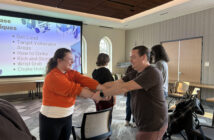Thomas Friedman, a three-time Pulitzer Prize winning reporter, author and columnist, delivered the 2025 Kenner Lecture on Cultural Understanding on Tuesday to an audience of hundreds in Zoellner Arts Center’s Baker Hall.
Friedman has covered international stories for The New York Times since 1981, serving as a columnist on foreign affairs, globalization and technology for the past 30 years. He is also the author of seven bestselling books analyzing a range of complex issues shaping the world, including “The World is Flat” and “Thank You for Being Late.”
He shared his understanding of global challenges in his lecture, titled “The Big Trends Shaping the World Today: Economics, Technology, and Geopolitics.”
The annual Kenner Lecture was established in 1997 by Jeffrey L. Kenner, ’65, ’66. The endowed series, hosted by the College of Arts and Sciences, has brought a range of speakers, like former United States Representative Liz Cheney, Pulitzer Prize winner Anne AppleBaum and New York Times writer Ezra Klein, to campus.
Robert Flowers, the Herbert J. and Ann L. Siegel dean of the College, provided the opening remarks, emphasizing how the Kenner Lecture brings speakers to campus who challenge commonly held views and encourage people to see the world through a new lens.
He said Friedman’s career has been defined by a commitment to exploring the ways rapid advancements and change are transforming our lives.
“As we face a world of increasing complexity and uncertainty, Mr. Friedman’s insights offer valuable guidance on how we can address the challenges of our time,” Flowers said.
Friedman began his talk aptly with the beginning of his career.
He got his start as a journalist in high school in St. Louis Park, Minnesota. There, he said, he had “that teacher, the one that changes your life” for an introductory journalism course — the only journalism class he’s ever taken.
Friedman went on to receive a bachelor’s degree in Middle Eastern studies and Arabic from Brandeis University, and then a graduate degree in Middle Eastern Studies at the University of Oxford.
The moment he became a writer, he said, was when he was studying in London. He was walking down the street with his then-girlfriend and now-wife when a blaring headline from the newspaper The London Standard caught his eye.
The headline, which focused on former President Jimmy Carter’s efforts to win Jewish votes during his presidential campaign, inspired him to the point that he immediately went back to his dorm and wrote a column about it. His wife then took the piece back to Iowa, specifically to the home of The Des Moines Register’s editorial pages editor, who was impressed and published it on a half page in the paper.
“I thought that was the coolest thing in the world,” Friedman said. “I had an idea, I wrote it up, and someone paid me $50.”
Today, Friedman said, he writes for three reasons — to learn, to teach and because it’s some of the most fun a person can have. He described his work as an incredible privilege and responsibility.
He also said no reader is interested in an “on one hand, on the other hand” point of view. Instead, he said, writers and journalists need to have a worldview, which he believes is a product of how you lean and how you learn.
His own worldview is ever-influenced by his adolescence in Minneapolis, Minnesota, where politics “just worked” when he was growing up, he said. He joked his New York Times column should’ve been titled, “Always looking for Minnesota.”
Friedman went from Minnesota to Beirut, where he covered the Lebanon Civil War between 1979 and 1981. His transition from a “working” to “broken” place taught him an anthropological approach to learning and journalism, he said, as he was crafting stories in Beirut by going out and interviewing dozens of people.
Today, whether he’s in the Middle East, the Lehigh Valley or anywhere else in the world, Friedman said he views events through a multidimensional lens.
“Wherever I go, I’m wearing 3D glasses,” he said. “I’m always asking, ‘What’s going on in human behavior and society, what’s going on in technology, and what’s going on in the environment?’”
Throughout his nearly 50-year career in journalism, he said the biggest lesson he’s learned is that the two most powerful human emotions are humiliation and dignity.
“All I’ve basically been doing is observing and writing on people acting out on their perceived sense of humiliation and questing for dignity,” Friedman said.
He said the other most important lessons include the power of listening — which helped him survive as a Jewish journalist in Beirut and Jerusalem — and the idea that ownership is everything for people.
Friedman then told the audience we are living through a distinct moment in history — one defined by unprecedented technological and environmental change. He said humans are the first species to drive from one climate epoch to another, as well as the first to create an artificial brain bigger than their own.
“Oh, friends,” Friedman said. “We are here for something really, really big. We’re here for a Promethean moment.”
He said what makes today a “Promethean moment” is the introduction of new technology and ideas that are not just requiring changes in one thing, but everything — systems of education, learning, government, innovation, crime, war and beyond.
Olivia Byers, ‘25, attended a student roundtable with Friedman prior to the lecture on Tuesday. She said she respected his honesty about the current state of the world when speaking with the students.
“I think a lot of the time, when people come in, or even professors who are lecturing, they sugarcoat it a little bit, just because they’re afraid people are going to have different perspectives and different opinions,” Byers said. “(Friedman) was very frank with us.”
She said she thought he made a good speaker for the Kenner Lecture because of his extensive knowledge of and experience in history and global politics, particularly in today’s tumultuous political landscape.
However, Byers said, it was also a wake up call to hear a person of his expertise be frightened by current events.
“It concerned me to see someone with so much experience and so much knowledge about what’s going on now (and) what’s gone on in the past, be so scared,” she said.
Friedman said while there are “big, hard” changes that need to be made today, they can be achieved together by recognizing truth and trust as the pillars of healthy democracy.
After Friedman concluded his lecture, Brian Creech, chair of Lehigh’s department of journalism and communication, joined him on stage to conduct a question and answer session.
The questions were pre-submitted by university faculty and surrounded topics including self-reflection amid changes to geopolitics, disconnects between the U.S. and China, the role of media in upholding democracy, and the potential for a new global order.
One question Creech asked Friedman focused on how major media outlets, columnists and journalists can hold those in power accountable without contributing to polarization.
Friedman said if there was ever a time he wanted to be a journalist and felt journalism was important, it’s today.
“This is a moment to be speaking truth to power, and I’m not tired,” Friedman said.






Comment policy
Comments posted to The Brown and White website are reviewed by a moderator before being approved. Incendiary speech or harassing language, including comments targeted at individuals, may be deemed unacceptable and not published. Spam and other soliciting will also be declined.
The Brown and White also reserves the right to not publish entirely anonymous comments.